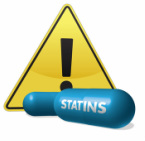CHOLESTEROL DRUGS CAN CAUSE MEMORY LOSS
Why Statins are Bad for the Brain
by Julian Whitaker, M.D.
More Reasons Not to Take Statins
Lowering cholesterol is not an end in itself
Besides their serious side effects—cognitive problems, muscle pain and weakness, fatigue, liver damage, and even heart failure—these drugs are just not all that helpful. Yes, they lower cholesterol, but lowering cholesterol should not be an end in itself; rather, it should be a means of reducing risk of heart attack and death from heart disease. In this regard, statins fail miserably.
Science does not support
Statins are not beneficial for women
Not a single study shows that statins are beneficial for women. Not one!
The largest randomized clinical trial of statins in women found that those who took Lipitor actually had 10 percent more heart attacks than women taking a placebo.
Statins are not beneficial to anyone over age 70
Nor is there any research suggesting that these drugs prevent heart attacks or extend life for anyone over age 70—women or men—including those at high risk of heart disease.
The same goes for younger men who have a high cholesterol level but no other significant risk factors for heart disease—statins just don’t help. In fact, potential cardiovascular benefits are counterbalanced by equivalent increases in death and debility from other causes. Yet millions of low-risk men, older men, and women of all ages take these drugs daily.
Only those with two or more high risk factors benefit
The only people ever shown in clinical studies to benefit at all from these drugs are middle-aged men at high risk of heart attack (high risk being defined as having existing coronary artery disease, diabetes, disease of the blood vessels to the brain or extremities, or two or more risk factors, such as hypertension and smoking).
But even for this group, there are far safer and more effective ways to lower risk than these very dangerous drugs.
Recommendations:
Dr. Julian Whitaker is the author of 13 health books, including Reversing Hypertension, The Memory Solution, Shed 10 Years in 10 Weeks, The Pain Relief Breakthrough, Reversing Heart Disease, Reversing Diabetes, and Dr. Whitaker's Guide to Natural Healing.
by Julian Whitaker, M.D.
More Reasons Not to Take Statins
Lowering cholesterol is not an end in itself
Besides their serious side effects—cognitive problems, muscle pain and weakness, fatigue, liver damage, and even heart failure—these drugs are just not all that helpful. Yes, they lower cholesterol, but lowering cholesterol should not be an end in itself; rather, it should be a means of reducing risk of heart attack and death from heart disease. In this regard, statins fail miserably.
Science does not support
Statins are not beneficial for women
Not a single study shows that statins are beneficial for women. Not one!
The largest randomized clinical trial of statins in women found that those who took Lipitor actually had 10 percent more heart attacks than women taking a placebo.
Statins are not beneficial to anyone over age 70
Nor is there any research suggesting that these drugs prevent heart attacks or extend life for anyone over age 70—women or men—including those at high risk of heart disease.
The same goes for younger men who have a high cholesterol level but no other significant risk factors for heart disease—statins just don’t help. In fact, potential cardiovascular benefits are counterbalanced by equivalent increases in death and debility from other causes. Yet millions of low-risk men, older men, and women of all ages take these drugs daily.
Only those with two or more high risk factors benefit
The only people ever shown in clinical studies to benefit at all from these drugs are middle-aged men at high risk of heart attack (high risk being defined as having existing coronary artery disease, diabetes, disease of the blood vessels to the brain or extremities, or two or more risk factors, such as hypertension and smoking).
But even for this group, there are far safer and more effective ways to lower risk than these very dangerous drugs.
Recommendations:
- If you are taking a cholesterol-lowering statin drug, discuss this information with your physician—or find one who is willing to by visiting acam.org or calling (888) 439-6891. To schedule an appointment at the Whitaker Wellness Institute, call (800) 488-1500 or visit whitakerwellness.com.
- I highly recommend Dr. Graveline’s books, Lipitor, Thief of Memory, available at amazon.com, and Statin Drugs Side Effects, sold at spacedoc.net. To order CDs of my interviews with Dr. Golomb and Dr. Graveline, visit healthytalkradio.com.
- If you or someone you know has had an adverse reaction to a statin drug, report it on statineffects.com and spacedoc.net.
- To learn more about safe, natural therapies for preventing and treating heart disease, read Reversing Heart Disease, available at (800) 810-6655, or visit the Subscriber Center at drwhitaker.com.
- Elias PK et al. Serum cholesterol and cognitive performance in the Framingham Heart Study. Psychosom Med. 2005 Jan-Feb;67(1):24–30.
- Golomb BA. Impact of statin adverse events in the elderly. Expert Opin Drug Saf. 2005;4(3):389–397.
- Muldoon MF et al. Randomized trial of the effects of simvastatin on cognitive functioning in hypercholesterolemic adults. Am J Med. 2004;117(11):823–829.
- Pfrieger FW. Role of cholesterol in synapse formation and function. Biochim Biophys Acta. 2003 Mar 10;1610(2):271–280.
- Physicians’ Desk Reference, 61st Edition. Montvale, NJ: Thompson PDR; 2007.
Dr. Julian Whitaker is the author of 13 health books, including Reversing Hypertension, The Memory Solution, Shed 10 Years in 10 Weeks, The Pain Relief Breakthrough, Reversing Heart Disease, Reversing Diabetes, and Dr. Whitaker's Guide to Natural Healing.

 RSS Feed
RSS Feed